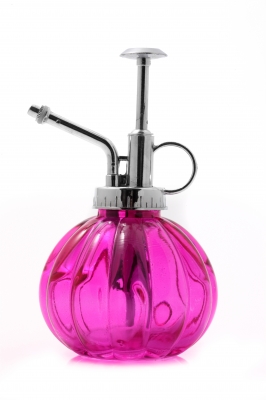
 Recently, our friends at Women’s Voices for the Earth (WVE) launched a new campaign called “Secret Scents” to encourage companies to disclose the ingredients they’re using in our personal care products to make them smell good.
Recently, our friends at Women’s Voices for the Earth (WVE) launched a new campaign called “Secret Scents” to encourage companies to disclose the ingredients they’re using in our personal care products to make them smell good.
(Reminder-WVE helped get Johnson & Johnson to agree to take out potentially harmful ingredients from their products last summer.)
We wholeheartedly agree with WVE’s mission to get these fragrance ingredients included on product labels.
That’s why we’re running our “Safe Skincare Campaign” right now in an effort to get toxin-free products into the hospitals and cancer centers where they’re needed most. (You can help–click here!)
Meanwhile, WVE is working to get big corporations to join in by making their products safer for us all.
Fragrance Irritations and Reactions Increasing
Right now, companies don’t have to tell us what the up to 200 ingredients are that they’re using to create that clean or powder-fresh scent. The problem is that many people are allergic to some of these ingredients, and are thus risking serious allergic reactions every time they use a product with fragrance.
According to a 2012 study, contact allergies to fragrance chemicals are increasing. Researchers conducted patch tests with 25 fragrance chemicals and fragrance mixes on 100 participants, and found that the more irritating the fragrances were to the skin, the more likely the person was to develop an allergy to it.
You don’t have to have sensitive skin initially to develop reactions to fragrances, by the way. While those with sensitive skin may be more vulnerable to irritation from fragrances, anyone can develop reactions after so many exposures-and we are all exposed to these chemicals several times a day. A study in 2011 even found that scented laundry products emit hazardous chemicals through dryer vents!
The WVE’s new report notes that millions of people are affected by skin allergies caused by chemicals in fragrance. Not only do we have to be concerned about the fragrance chemicals themselves, but many products use hormone-disrupting phthalates to make the fragrances stick to skin and hair. (Phthalates have been linked to diabetes and childhood asthma.)
WVE’s report notes that fragrances in household and personal care products are some of the most frequently identified allergens. Women are also more likely to have these allergies than men, they say, potentially because we’re exposed to so much more through cosmetic products.
Yet companies aren’t required to disclose those ingredients, so it’s very difficult for consumers to find them-and difficult for dermatologists to test for allergic reactions to specific chemicals. So while you may suffer from red bumps, itchiness, blisters, and blotchiness in the skin, you will probably be unable to determine exactly which product or fragrance chemical is responsible. This means that you’ll have to stay completely away from fragrances altogether, which is a difficult thing to do in today’s market.
“Every day too many women suffer from reactions to secret chemicals used in fragrances in their household products,” said Alexandra Scranton, director of science and research for WVE.
What You Can Do
If you’re concerned about secret scents and not knowing what chemicals you’re breathing in and putting on your skin and hair, please join us in taking action to make a change.
- Read WVE’s full report, “What’s That Smell?”
- Sign up for WVE’s Action Network to learn more about how you can support policies that protect us from toxic chemical exposure.
- Until companies start telling us what’s in their fragrances, choose fragrance free personal care products and healthier alternatives to fragranced cleaning products.
Do you suffer from fragrance allergies? Please share your story.
Picture courtesy Ambro via FreeDigitalPhotos.net.
Sources
Nagtegaal MJ, “The role of the skin irritation response in polysensitization to fragrances,” Contact Dermatitis, 2012 Jul;67(1):28-35, http://www.ncbi.nlm.nih.gov/pubmed/22435471.
Hannah Hickey, “Scented laundry products emit hazardous chemicals through dryer vents,” Cleaner Indoor Air, August 24, 2011, http://cleanerindoorair.org/scented-laundry-products-emit-hazardous-chemicals-through-dryer-vents/.


